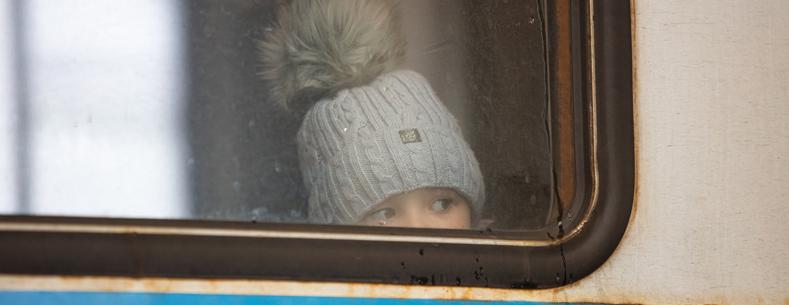Last week the Minister for Social Justice made a statement marking the 25th anniversary of Refugee Week (19-25 June).
Referring to this year’s theme of ‘compassion’, the Minister highlighted the ongoing work carried out by local government, the third sector and others to support refugees who come to Wales.
While immigration policy is reserved to the UK Government, the Welsh Government has been able to adopt a different approach in some areas. For instance, in response to the crisis in Ukraine, the Welsh Government took the opportunity to sponsor refugees and provide additional support via welcome centres.
Acknowledging that more work could be done to support refugees, the Minister committed to refreshing the nation of sanctuary plan this year. However, the UK Government’s Illegal Migration Bill could have a significant impact on Wales’ commitment to being a Nation of Sanctuary. This article examines the impact of the Bill and key issues the Welsh Government needs to consider when refreshing its plan.
“Profound concern” about the impact on children
Setting out what the Illegal Migration Bill does, the UK Government has said:
The Illegal Migration Bill places a duty on the Secretary of State to make arrangements, as soon as reasonably practical, to remove any person who enters the UK illegally and has not come directly from a country where their life and liberty was threatened. They will be removed to either their home country (if safe to do so) or to a safe third country.
A key concern by some stakeholders is how this will apply to unaccompanied asylum-seeking children and young people. If the Bill is passed, the Secretary of State will have the power to remove an unaccompanied child from the UK before they turn 18 years old. The UK Government has said it would only do so in very limited circumstances (i.e. to reunite them with family members).
The Bill gives the Secretary of State new powers to provide or arrange accommodation and support for unaccompanied children until a local authority receives them into their care.The Secretary of State would also have the power to transfer a child back to Home Office accommodation from the local authority. This power could be used to detain children prior to deportation as an adult, or in the event it is decided they will be removed while still a child.
Amendments made to the Bill will also allow the Secretary of State to consider a child who refuses to give consent for a ‘scientific age assessment’ (i.e. examination and measurement of parts of a person’s body and radiological assessment, including dental x-rays) to be treated as an adult.
Leading children’s charities have expressed “profound concern” for the children the Bill would affect. Children’s charities in Wales say the Bill undermines the “child first, migrant second” approach in Wales.
Senedd Members vote to withhold consent
The UK Government has stated that it does not believe that the Bill’s provisions relate to matters within the legislative competence of the Senedd and is therefore likely to proceed with the Bill on that basis.
The Welsh Government disagrees and has set out why in an Legislative Consent Memorandum (LCM) for the Bill in March and a Supplementary LCM. They state that social services functions are fully devolved to the Welsh Government and all policy decisions relating to social care, including the care of unaccompanied asylum-seeking children, are for Welsh Ministers.
The LCM has been referred to the Senedd’s Legislation, Justice and Constitution, Children, Young People and Education and Equality and Social Justice Committees for their consideration.
The Equality and Social Justice Committee concluded that it’s important for the Welsh Government to consider what the Bill’s implementation might mean for Wales. The Committee suggested that the Welsh Government should conduct an “Impact Assessment on the impact of the Bill in Wales with a view to informing the devolved public sector’s policy response”.
The Committees also received evidence setting out why the Welsh Government should establish an independent guardianship scheme which provides advice and advocacy for unaccompanied children.
A scheme is already operating in Scotland and was recommended by the UNCRC Committee on the Rights of the Child. A scheme is not available in Wales (despite repeated calls to establish one) and stakeholders argue that the Bill strengthens the arguments for doing so.
On 20 June, a majority of Senedd Members agreed to withhold their consent to the provisions covered by the two legislative consent memoranda. Plaid Cymru Member of the Senedd, Sioned Williams described the Bill as “an ineffective and ill-founded piece of legislation” and said “the elected representatives of the people of Wales, must be given the right to decide what benefits our own communities and who we would welcome to those communities”.
Backing the Bill, Welsh Conservative Member Mark Isherwood said “As illegal migration is restricted, the UK government will have greater capacity to provide a safe haven for those at risk of war and persecution” and called on the Welsh Government to work alongside the UK Government to increase “safe and regular routes”.
A refreshed Nation of Sanctuary Plan
The Welsh Government will need to consider the impact of the Bill if passed, in particular on its Nation of Sanctuary plan, which the Minister has committed to refresh this year.
The Minister told the Senedd earlier this month that she was establishing a ministerial board and broadening the scope of the existing refugee taskforce.
When revising the plan, the Welsh Government will need to consider the impact of the Bill but also other issues relating to the implementation of the Nation of Sanctuary policy. Some key issues include:
- The Welsh Government is responsible for health. But a recent study into NHS interpretation services found that accessing these services can be difficult for asylum seekers and refugees, sanctuary seekers and NHS staff. During its inquiry into Violence Against Women, Domestic Abuse and Sexual Violence the Equality and Social Justice Committee found this was also an issue facing migrant women.
- The Local Government and Housing Committee has expressed concerns about whether there is sufficient accommodation for Ukrainian refugees who had been sponsored by the Welsh Government.
- A recent report identified a lack of immigration advice in Wales. It recommended the Welsh Government take a strategic lead in ensuring access to advice for all migrants.
- The Bevan Foundation has urged the Welsh Government to “take a broad, proactive and inclusive policy approach to all migrants in Wales”. Rather than focus on asylum seekers and refugees they say a plan should consider the needs of all migrants who may require support, protection and specialist services.
The Welsh Government will also need consider how to ensure all those living in Wales embrace the idea of a nation of sanctuary. An analysis of the UK Government’s ‘Stop the Boats’ campaign by the organisation ‘Hope not Hate’ has found that “both government statements and media coverage play a role in driving far-right engagement around migration”.
The Minister for Social Justice acknowledges issues related to the rise of the far right and has said that Wales “is not immune to the hatred and intolerance we've seen elsewhere”.
The refreshed Nation of Sanctuary plan will need to consider ways in which to tackle this issue - recognising that a warm welcome also relies on the people who live alongside those who seek sanctuary.
Article by Claire Thomas, Senedd Research, Welsh Parliament






